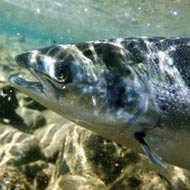
Actinopterygii have survived four out of five mass extinction events
Ray-finned fishes could be the hardiest animals on the planet, having endured four mass extinction events that killed off many other groups, according to researchers at the University of Bristol.
Ray-finned fishes, or Actinopterygii, make up around 50 per cent of all vertebrates alive today. With more than 32,000 species, this extraordinary group has evolved over a period of 400 million years.
Actinopterygii survived four of the big five mass extinction events of the last half a billion years. But how these events formed the group’s evolution is not well understood.
In a study, researchers at Bristol University looked in detail at how actinopterygians fared during two of these major mass extinctions - the Permo-Triassic and end-Triassic extinctions - by looking at how their body shape and jaw shape changed over time.
“We found little evidence of any negative impact of with extinction event on the group, with no major changes in either body shape or jaw shape,” said lead author Fiann Smithwick from the University of Bristol’s School of Earth Sciences. “This is especially surprising as the Permo-Triassic extinction event was the biggest of all time and is thought to have wiped out over 90 percent of marine species.”
The findings suggest that Actinopterygii suffered less than other animal groups during the extinction events and may have been able to adapt better to environmental change.
Bristol University says that understanding how animal groups survived mass extinction events could have important implications as we likely enter a sixth man-made extinction event, caused by global warming.



 The Veterinary Medicines Directorate (VMD) is inviting applications from veterinary students to attend a one-week extramural studies (EMS) placement in July 2026.
The Veterinary Medicines Directorate (VMD) is inviting applications from veterinary students to attend a one-week extramural studies (EMS) placement in July 2026.